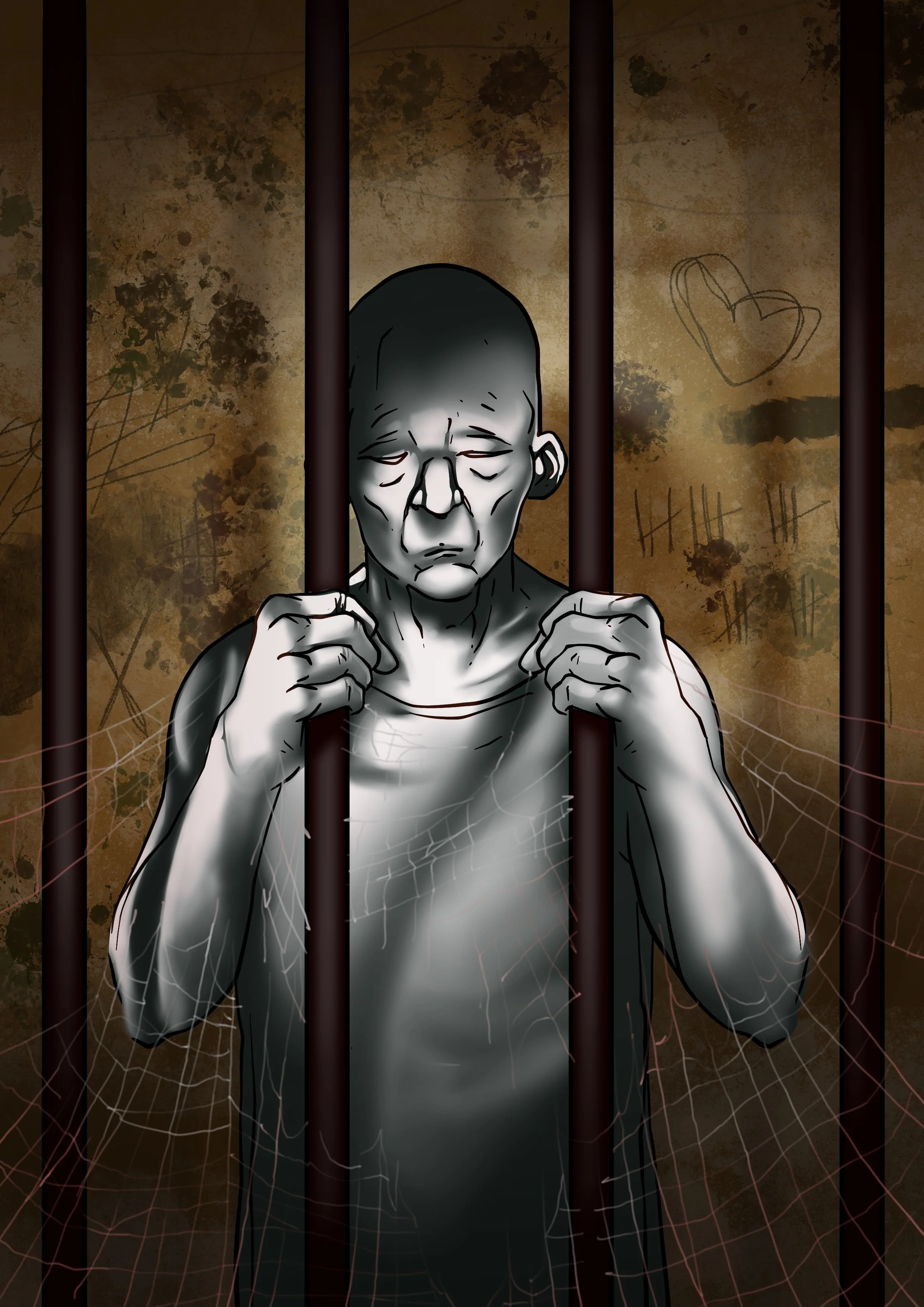Interview on “judicial period” and time limits in the Libyan Code of Criminal Procedure
Saad Said
A Libyan lawyer and academic researcher, who practiced law during the Jamahiriya regime and continue to practice law to this day.
1. Based on your 20 years of law practice, is there any difference between your studies on the time periods in the Libyan Code of Criminal Procedure related to depriving a suspect of his freedom in pretrial detention until the issuance of a judicial verdict?
In theory, there is no difference. In practice, the difference lies in the investigating authority or the judging authority’s assessment of the reasons for pretrial detention. The decision for pretrial detention, in particular before the investigating authority, became common without any consideration to the criteria for its necessity as a precautionary measure, making it a premature punishment. Unfortunately, the Libyan legislator continues to deprive the suspect of the right to appeal against this measure (pretrial detention).
2. Do you think that the legal culture in Libya, whether of judges, other law enforcement officers, or lawyers, is aware of the issue of reasonable judicial period as one of the requirements for a fair trial?
In fact, there is not enough awareness, as evidenced by the large judicial backlog of cases and the delay in adjudicating them. This is an issue that everyone recognizes and remains without a practical solution to hold a trial in a reasonable time. Comparative judiciaries detected this issue and devised solutions to it, including “immediate appearance,” meaning speedy court dates in certain cases, which has alleviated the judicial backlog, accelerated adjudication, and allowed defendants to have fair and speedy trials.
Justice must be achieved within a reasonable time appropriate to the nature of the facts of the case for which the accused is being tried. In legislation, the Libyan Code of Criminal Procedure does not regulate a period for the completion of the trial.
3. As an experienced lawyer, what is the importance of respecting the time periods in the Code of Criminal Procedure and what are the consequences for not complying with it?
Justice must be achieved within a reasonable time appropriate to the nature of the facts of the case for which the accused is being tried. In legislation, the Libyan Code of Criminal Procedure does not regulate a period for the completion of the trial, it only regulates some other periods, including the period of pretrial detention, the period between notifying the defendant and the date of the hearing to enable him to prepare for the trial, in addition to the period for appealing rulings. However, the law does not regulate the period of the trial, leaving it to the discretion of the trial judges alone, and in case of breach or delay, the accused or his defense can only resort to the Judicial Inspection Department with a complaint about the matter.
There are numerous reasons for not respecting the time periods in the Libyan Code of Criminal Procedure, the most important of which is the large number of cases before the judiciary and their accumulation, leading to slow adjudication. There is a lack of alternative means of litigation, including reconciliation or mediation. There are no legislative solutions specifying a maximum period or deadline for the trial, and the matter in law is open and subject to the discretion of the trial judges.
4. What are the main reasons for not respecting the time periods in the Libyan Code of Criminal Procedure?
There are numerous reasons, the most important of which is the large number of cases before the judiciary and their accumulation, leading to slow adjudication. There is a lack of alternative means of litigation, including reconciliation or mediation. There are no legislative solutions specifying a maximum period or deadline for the trial, and the matter in law is open and subject to the discretion of the trial judges. All these reasons and others are behind the lack of respect for the completion of a trial in a reasonable and appropriate time.
5. Does the state of instability affect this?
Yes, instability has a major impact. For example, the trial of former regime figures started in 2011 and still continues. The sessions are postponed for long periods between one session and another, or postponed several times because the defendants were not brought to the court headquarters, which is abnormal. The reason behind it is the unstable security situation, which in turn affected a fair and efficient trial for those defendants.
6. How do the Libyan state and judicial bodies assess judicial periods and time limits?
As mentioned earlier, the matter is left to the discretion of the court, and the judge’s conscience is the only control in this regard. In many cases, the judge underestimates his discretion in timing, and dates are set far apart, even if the request for a postponement does not warrant it. The postponement is proportional to the number of cases that will be heard later, so the judge distributes his cases according to a certain number, and thus the time period is estimated in a way that suits the judge’s circumstances and not in proportion to the nature of the procedure or work for which the postponement is requested.
7. On average, approximately how long does a preliminary investigation take?
This depends on the nature of the facts and the time required to prove or disprove them. For example, if a case requires hearing witnesses or conducting technical work that needs to be referred to judicial expertise, there certainly needs to be time to accomplish this. According to the law, the investigating authority must refer the case papers once ready for referral. The problem in many cases is that time is consumed and the defendants’ detention is extended to complete any of these procedures (waiting for expert reports, or witnesses not appearing). This prolongs the time of the case and is used as justification for the defendants’ continued pretrial detention.
8. On average, how long does a preliminary criminal trial of an arrested person take?
There are no specific periods. It is customary to set the earliest session for the trial to take place, which is at the discretion of the court and the volume of cases before it. This discretion leads to a violation of the defendant’s right to a trial within a reasonable time, as the trial may be prolonged under the pretext that the number of cases before the court exceeds its ability to adjudicate them within a reasonable time. After a verdict is issued, the defendant and the public prosecution have the right to appeal either by appeal in misdemeanor cases or by cassation in felony cases. Cases before the Court of Cassation take a long time for a ruling, and the defendant may serve the full term of the contested sentence before the Court of Cassation issues a dismissal, which is partially useless as the defendant has already served the sentence. This is common in many cases.
9. What if a party, such as the defendant or the plaintiff, causes the litigation to be prolonged? How to legally avoid this?
If the defense deliberately prolongs the proceedings by, for example, not attending the hearings, the judge can impose a fine. Now, this fine is of small financial value, as it was set at the time the law was issued and has not been amended to match current inflation. The judge may further put an end to other delays, including repeated requests for an adjournment. The judge may set a specific inevitable deadline, after which the defense will not be granted an adjournment if it requests one for the same reason.
10. Are there time periods and deadlines that conflict with the right to a fair trial? Can you cite some examples?
Other than the periods mentioned earlier, there are no periods or deadlines in Libyan law that regulate a trial. In fact, to reach a trial in a reasonable time, the Code of Criminal Procedure requires an amendment to introduce regulations or criteria governing the time periods, and to be a reference in assessing the duration of the trial, as leaving the matter to the authority of the judge has become insufficient, as it is a personal criterion that may be fulfilled in some and not in others.
In practice, numerous violations mar the rules of judicial period. Most cases of former regime figures, referred to earlier, remain pending trial before the judiciary, similar to many other cases. The situation will continue and worsen unless the legislator intervenes to regulate this.
11. How do you assess the Libyan judicial application of the rules of judicial period in relation to detainees during the proceedings and the duration of the trial?
In practice, numerous violations mar the rules of judicial period. Most cases of former regime figures, referred to earlier, remain pending trial before the judiciary, similar to many other cases. The situation will continue and worsen unless the legislator intervenes to regulate this. In addition, the Supreme Judicial Council needs to address this problem and attempt to issue regulations to help control the estimation of time duration, especially during the trial of pretrial detainees.
12. What amendments do you propose to overcome these violations in the legal article so that Libyan justice is complete and respects the principles of fair trial regarding the judicial period?
The legislator can set a maximum period for a criminal trial, especially for those in pretrial detention during the trial, and set reasonable exceptions that may be required by some procedures. These amendments are not difficult and are an urgent necessity amid laxity in adjudication and prolonging the duration of cases without justification.
Judicial period in Libya
“The legislator can set a maximum period for a criminal trial, especially for those in pretrial detention during the trial, and set reasonable exceptions that may be required by some procedures. These amendments are not difficult and are an urgent necessity amid laxity in adjudication and prolonging the duration of cases without justification.”



